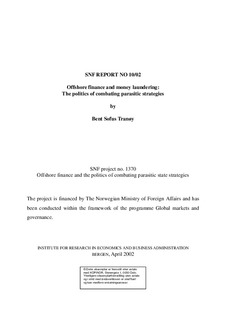Offshore finance and money laundering : the politics of combating parasitic strategies
Research report

Åpne
Permanent lenke
http://hdl.handle.net/11250/164839Utgivelsesdato
2002-04Metadata
Vis full innførselSamlinger
- Reports (SNF) [542]
Sammendrag
In recent years the number of states and territories that try to attract financial flows through offering a combination of lax regulation and strict secrecy laws has shot up. These types of state-strategies can be described as parasitic when they entail seeking to attract business in ways that are detrimental to global welfare and the rule of law. They can also represent misuse of sovereignty in so far as sovereign states have offered tools explicitly designed to defeat the laws of other countries. Since the late 1990s a series of international initiatives have been launched through the G7’s Financial Action Task Force on Money Laundering (FATF) and Financial Stability Forum (FSF) and the OECD in an effort to combat global financial abuses, and in some respects impressive headway has been made. This report discusses four questions relating to the problems caused by financial havens in general, and those raised by offshore financial centres in particular. The first two issues relate to the role and significance of financial havens respectively. Against this backdrop a short review of current regulatory initiatives against money laundering, (“harmful”) tax competition and rogue banking is given. Then a case study of the relatively successful FATF process to combat money laundering is undertaken. It is argued that the FATF may well be close to optimal as regards size and composition for a standard setting body. The report concludes with an assessment of policy options in the area of offshore finance with special emphasis on money laundering. The main thrust of the advice given is to continue to prioritise and broaden the processes already under way.
Utgiver
SNFSerie
Report2002:10